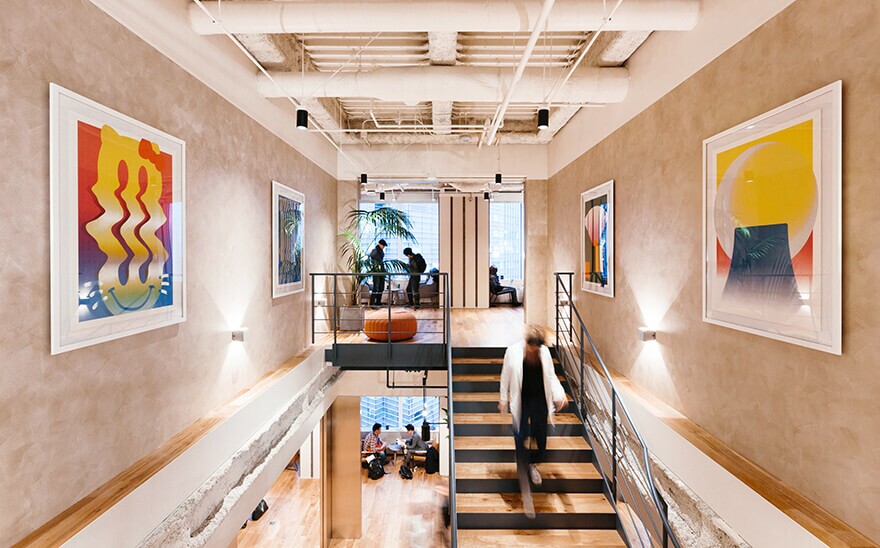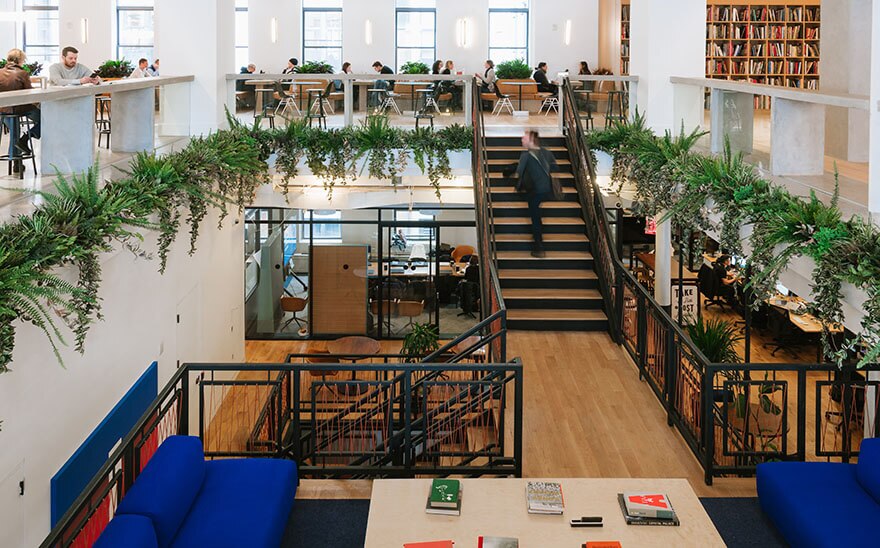Should You Lease an Office or Use a Coworking Space?

Debating whether to lease an office or coworking space in the post-COVID era? Read LoopNet's updated advice weighing the pros and cons of the office vs. coworking debate.
It's official: You're launching or growing your business and the kitchen table workspace isn't going to cut it. It's time to look for an office space—either through a traditional lease or a coworking membership. Which should you choose?
Coworking spaces emerged about a decade ago, offering entrepreneurs, remote employees, and freelancers an alternative place to work other than a local Starbucks. According to data from Emergent Research and the Global Coworking Unconference Conference (GCUC), there were 542,000 coworking members inside the U.S. in 2017—a group expected to grow to include 754,000 members in 2019, and projected to jump even higher to 1.76 million members by 2022.
Members—who pay for a desk, a private office, or an area within a larger, amenity-rich space—include employees of established companies and even mega-corporations in need of flex space. In 2017, 3,205 U.S. coworking offices existed, with 21,306 offices projected for 2019 and 30,432 by 2022, according to the GCUC report.
Some providers now also build out, design, and manage spaces as part of the broader workplace as a service industry. The big question remains: Is coworking the right fit for your business, or is traditional office leasing the better choice?

The Coworking Attraction
Flexibility tops the list of desirable coworking features. On a monthly basis, members can decide the type of workspace that best suits their needs—which helps avoid upfront fees, deposits, and the contractual obligations of a lease.
Must start immediately? No problem. Want reliable, high-speed WiFi, printers, and coffee on demand? You're covered. Need a spot that's pet-friendly, has a staffed reception desk, and even luxe amenities such as ping-pong tables, nap stations, and a gym? You'll find it.
Different coworking options offers the basics and beyond. When you don't have worry about furniture, supplies, or establishing company culture, work can become the sole focus.
That doesn't mean company culture won't exist; Members can attend hosted happy hours, lunch workshops, and other networking events designed to connect potential clients and investors. For example, RocketSpace, a coworking space in San Francisco, offers workshop talks covering topics such as ROI-generating email strategies and successful customer experiences.
Cons of Coworking
Distractions are a fact of coworking life. Blurred lines between work and socializing can cause friction. On days you need to concentrate, an office-mate may distract your workflow by engaging in chatter.
Plus, with privacy concerns abound, sensitive business or client-related discussions will similarly involve seeking a quiet corner.
It's also more difficult to brand; Even private coworking offices typically can't be decked out with logos or signage. Costs can easily add up as a company expands, too. Once you hire more than a few employees, traditional office leasing may be the bigger financial win.

Office Lease Dealings
A traditional three-year lease on office space can be intimidating and risky for small companies, especially startups. Upfront investment in furnishings, office equipment, renovations, and fit-outs also make many business owners leery.
Yet, picture this: your logo is on the door, with custom furnishings and decor to suit. You don't require permission to throw a party, host visitors for an event, or everyday tasks such as simply adjusting the thermostat.
Inventory is on your side, too. Coworking comprises just 1.6 percent of commercial office space, according the real estate services company Colliers International's 2019 U.S. Flexible Workspace Outlook Report.
Another positive: In this age of coworking, traditional landlords are responding to the competition with their own flexible workspace and lease options.
Decision Time
The Colliers report calls coworking a "bright shiny object", that requires careful thought before making the jump. On the other hand, for companies with just a handful of employees, it could be the better investment.
Consider these key questions:
- Do the values of the coworking environment or provider match those of you and your company? For example, WeWork's meatless policy, which was implemented in 2018, impacts not just employees but members at over a hundred locations with self-service food kiosks.
- How conservative are clients, and how often will they visit? Traditionalists may not see past the ping-pong table located en route to the conference room.
- What will your company look like in a few years? When that's impossible to answer, an ultra-flexible coworking environment may be the ticket. However, if a a clear vision and growth plan is in the forseeable future, an office lease may be your answer.
